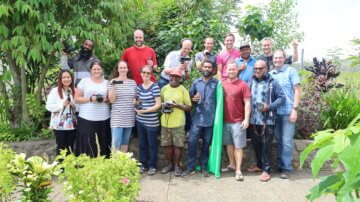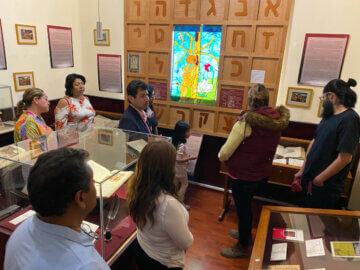Vision, Goals and the Alliance
A message from Stephen Coertze, Executive Director, Wycliffe Global Alliance
Dear Friends:
Networks and even news media buzz with talk of new, collective visions for the Bible translation movement. Meanwhile, people at some individual organisations around the world are collectively asking: Wait, what? Is this a directive? Are we part of this?
As new partner organisations – both formal and informal – join in Bible translation, our movement grows increasingly complex. Missions, visions, goals and even networks can overlap. For instance: Two Wycliffe Global Alliance organisations are also part of Every Tribe Every Nation (ETEN) — which defines itself as “a collective impact alliance of Bible translation partners and resourcing partners working together to eradicate Bible poverty in this generation". Ten Bible translation organisations, along with philanthropy partners, are part of ETEN. The same 10 are also part of illumiNations—which ETEN calls a “convening platform for the Bible translation movement.” According to ETEN, one might think of illumiNations as “an external moniker to describe what God is doing globally through collective impact.”
That’s a lot of alliances, organisations, partners and definitions to keep track of.
On top of all that, global celebrations are being planned already for 2033 as the 2,000th anniversary of Jesus’ death and resurrection (and yes, all involved do know that our calendar might be off by several years). ETEN and illumiNations have embraced an initiative called 2033 All-Access Goals: By that year, they want to see at least a portion of the Bible translated into every language that still needs it. Meanwhile, other organisations or networks around the world proclaim initiatives such as Vision 2025, Vision 2033, OBT 1000 and Vision 2050.
Attempting to understand how all of this fits together can be overwhelming. Clarity can be found as we answer two key questions:
- What the Wycliffe Global Alliance is and is not; and
- The difference between a vision statement and goals.
Purpose and Mission
The Alliance is made up of almost 120 organisations held together by a set of shared values and an agreement, or covenant, of how we will work together. These are summarized nicely in our mission, purpose and vision statements.
Our Mission Statement tells what we do: In communion with God and within the community of His Church, the Wycliffe Global Alliance contributes to the holistic transformation of language communities worldwide.
Our Purpose Statement declares who we are and how we fulfill our mission: As a community of participants in God’s mission, the Wycliffe Global Alliance offers leadership, influence and service within Bible translation movements.
Vision
All of those worthy “vision” initiatives with a year attached to them are really goals: by a specific year, a specific objective will be reached. Goals are good. They motivate us. Sometimes they refresh our broader vision. They certainly build excitement and motivate financial partners. But they are not universal. These terms and phrases might be the heartbeat of some Bible translation organisations and not even be on the radar of others. On the surface, some of these goals may even appear to compete against each other.
The goals do reflect a common vision in the Bible translation movement: a collective, desired future when all people have access to the full counsel of Scripture. The Wycliffe Global Alliance vision statement says simply: Individuals, communities and nations transformed through God’s love and Word expressed in their languages and cultures. In short, Bible translation is why the Alliance exists.
Our Alliance Vision Statement is deliberately nonspecific, and it is not directed by any other organisation or group. We do not list tasks and objectives that all Alliance organisations need to accomplish, or universal goals to be reached by a certain date. Each organisation has the freedom to make its own, unique contribution to the movement. How each organisation carries out the Alliance vision depends on what God gives them to do and calls them to be. This includes serving together in various capacities and configurations. Many parts, one body.
No Alliance organisation should aspire to be any other when they “grow up.” In the Alliance, no missional intent is imposed on any organization, other than the broad category of working in Bible translation. The idea of adopting someone else’s vision can be attractive and in some cases it is certainly appropriate. But remember: God speaks to us all, and we are not all called to be the same thing. It’s easy to subscribe to someone else's exciting vision, but not as a substitute for listening to what God has in store for each of us in our particular contexts. The Alliance includes a huge diversity of organizations, and all have other affiliations as well. It makes sense, then, that each would have distinctive vision and mission statements, intents, goals and strategies— all being compatible with the Alliance Foundational Statements. Then, from those statements grows missional intent: discovering where and how God desires us to focus our hearts, minds and actions.
Common Ground
Some of these foundational statements might be shared among a subgroup of Alliance organisations, or even across networks. The 2033 All Access Goals are an example. The initiative is currently shared by 10 organisations in the illumiNations movement, which first emerged among North American Bible translation and philanthropy partners. Today the movement is seeing expansion into Asia, southern Africa and the UK. A vision such as this certainly could be acknowledged and/or affirmed by other Alliance organizations should they choose. But there is no requirement.
Another example would be Vision 2025, adopted by Wycliffe organizations and SIL back in 1999. Most current Wycliffe organizations joined what is now the Global Alliance after this vision was introduced. Some have promoted it as a major motivational tool with their constituencies and their own personnel, while others have not. The Alliance itself embraces Vision 2025 and will celebrate this influence on the movement in 2025. But again, there has never been a requirement for Alliance organisations to individually adopt this.
I know this all takes time to understand. Sometimes it can even appear as though a number of organisations or networks are competing for the same ground — and that feels wrong. Situations where the perception of competition arises call for prompt conversation, prayer and space to ask questions and listen to all perspectives.
Ultimately, we all are doing kingdom work and leaning on God for guidance. In our community of organisations, we embrace and proceed with the purpose, mission and vision he has placed in front of us. Sometimes those are common, and to be celebrated. Often they are specific to organisations, people and places. Those are to be celebrated, too, because they are as diverse as the world we serve.
In God’s grace,

Stephen Coertze
Executive Director
Alliance organisations may download the images from this article.
If you would like to discuss this topic further, please contact your Area Director.
The latest
View all articles
Informing, teaching, inspiring: PNG workshop teaches video storytelling for language communities
PNG workshop teaches video storytelling for language communities
Read more
Looking ahead at 2024
As the year unfolds, we marvel at the work of God in our rapidly changing world. And, we look forward to a number of gatherings and conversations intended to draw us together.
Read more
Telling the Bible's Story
It may come as a surprise that a museum is among the Wycliffe Global Alliance organisations.
Read more